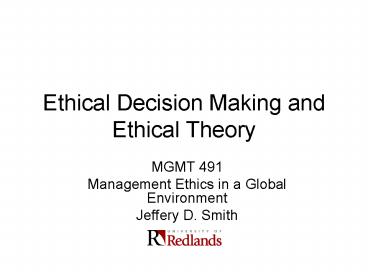Ethical Decision Making and Ethical Theory PowerPoint PPT Presentation
1 / 18
Title: Ethical Decision Making and Ethical Theory
1
Ethical Decision Making and Ethical Theory
- MGMT 491
- Management Ethics in a Global Environment
- Jeffery D. Smith
2
- Ethical Decision Making
- Applying general values and ethical principles in
- concrete circumstances in order to justify a
- particular decision or course of action.
- awareness
- judgment and deliberation
3
Basic Ethical Values for Business?
- Trust
- Honesty
- Fairness
- Autonomy/Freedom
- Impartiality
- Integrity
- Beneficence
- Authority
- Property
4
Sample Correlative Principles
- One ought to negotiate in good faith
- Honor your agreements
- Compensation should be based on merit
- Customer data should be kept private
- Provide sound advice to clients
- Respect your organizations mission statement
- Support local communities when downsizing
- Obey all environmental regulations
- Respect the trade secrets of competitors
5
PARTICULAR JUDGMENT OR DECISION
ETHICAL PRINCIPLES
VALUES
ETHICAL THEORY
6
- Ethical Decision Making is not algorithmic
- Ethical Decision Making often involves a use of
principles that are not subjective - Ethical Decision Making is characteristically not
simply self-interested - Ethical Decision Making often involves a use of
principles that are not socially or culturally
relative
7
Principles and Priorities A 6 Step Procedure
- 1 Identify and Define the Problem
- 2 Analyze the Principles Relevant to the Problem
- 3 Analyze what Principles are the Most Decisive
- 4 Evaluate the Analysis in (1)-(3)
- 5 Make a Decision Expressing the Priorities
- 6 Assess the Consequences of Your Decision
8
CONSEQUENTIALISM
actions are right insofar as they improve good
consequences wrong insofar as they produce bad
consequences
ethical egoism (goodsatisfaction of
self-interests)
Utilitarianism (goodhuman welfare)
hedonic (goodpleasure)
preference (goodpreference satisfaction)
eudaimonic (goodhappiness)
9
Jeremy Bentham (1748-1832)
10
- John S. Mill (1806-1873)
11
Deontology
- deontological the logic or science of duty
- deonduty logoslogic (sometimes science)
- A deontological ethical theory is one which
holds that some acts are ethically required
independently of their consequences. - Generally speaking, we are obliged to refrain
from killing, stealing, lying, etc., regardless
of whether refraining from these things promotes,
for example, human happiness, welfare, or
preference satisfaction.
12
- Immanuel Kant
- (1724-1804)
13
- Actions are ethically right in so far as they are
motivated by a good will. - A good will is a will that is moved by reason and
not wishes, desires, and preferences - Ethical principles are imperatives, or commands
of reason
14
- The 2 Formulas of Kant's Categorical Imperative
- Act only according to that maxim by which you
can at the same time will that it should become a
universal law. (universal law formula) - Act so that you treat humanity, whether in your
own person or in that of another, always as an
end and never as a means only. (humanity formula)
15
- Universal Law Formula
- 1. Form a maxim
- 2. Universalize the maxim
- 3. Determine rational acceptability
16
- Humanity Formula
- Humans have inherent dignity and incomparable
worth because they are rational creatures,
capable of autonomy - Never use the rational capacities of another
human being to further your own interests. - The inherent dignity and incomparable worth of
humans demands basic rights or core entitlements.
17
Virtue Ethics
- An emphasis on the traits, dispositions, and
inclinations needed to lead a life of moderation
that balances the ends of overlapping roles and
relationships in a community. - Aristotle (384-322 BC)
- Virtuearete (or excellence)
- Happinesseudaimonia
- Ethical judgmentphronesis
18
TRUTHFULNESS SELF-CONTROL GENEROSITY TEMPERANCE SI
NCERITY COURAGETOLERANCE CIVILITY MODESTY TACTFUL
NESS JUSTICESolomon, R. (2002). Corporate
Roles, Personal Virtues An Aristotelean Approach
to Business Ethics. In Donaldson, T., Werhane, P.
and Cording M. (Eds.), Ethical Issues In
Business A Philospohical Approach (pp. 71-82).
Upper Saddle River Prentice Hall.

